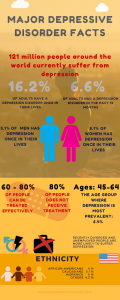What are the depression causes?
For scientists it’s still unclear the depression causes are. They did, however, find a lot of risk factors that contribute to the development of depression or that may trigger its development. The answers to the question ‘what the depression causes are’, are often the same: chemicals in the brain, traumatic life events or inheritable genes. But other factors play a role as well: stress, alcohol and/or drug abuse or a side effect of prescription drugs. This page is dedicated to those factors that may contribute or trigger a depression.
For more information, please read:
At Barends Psychology Practice, we offer treatment for various types of depression. Interested? Make an appointment for a first, free of charge, session now! Go to Contact us. (Depending on your health insurance, treatment may be reimbursed).
Depression causes – hormones.
Changes in hormone levels (e.g., oestrogen and other sex hormones) can affect the onset of depression or trigger a depression by causing an hormonal imbalance. An hormonal imbalance could trigger depressive symptoms, such as feelings of sadness, emptiness, irritability and sleeping problems. Cortisol is an hormone that is produced in abundance in people with depression. Cortisol is also known as a stress hormone. Stress negatively affects symptoms associated with depression.
Changes in hormone levels may be the result of thyroid problems, (pre) menopause problems, premenstrual problems and pregnancy.
Depression causes – brain structure.
In people who are (or have been) depressed small differences in the brain structure occur. For example the Hippocampus is smaller in people with depression (sometimes up to 20%) [1] compared to people without a history of depression. The longer depression lasts the smaller the hippocampus. The Hippocampus is very important for memory and learning purposes. As a result of a smaller Hippocampus there are less serotonin receptors, which makes it more difficult to process emotions. Fortunately, studies show that the Hippocampus can regenerate after a successful depression treatment.
Depression causes – brain chemistry.
(Advertisement. For more information, please scroll down.)
Neurotransmitters (e.g., serotonin, norepinephrine and dopamine) are likely to cause or trigger depression (partially).
- A serotonin shortage in the brains can be one of the depression causes. This shortage can make someone feel suicidal as well. Serotonin regulates physiological functions such as sleep, sexual behaviour, aggression, appetite and mood.
- A serotonin shortage can also disturb the balance of other neurotransmitters, which in turn could result in triggering a depression.
- People with a history of depression may have a dysfunctional norepinephrine system that doesn’t respond well to stressful situations.
- Depressed people who experience less joy are likely to have low dopamine levels (dopamine is associated with the reward and joy seeking behaviour).
The examples above show that depression and depression symptoms can be caused and triggered by a chemical imbalance in the brains.
Depression causes – genetic predisposition.
People whose blood relatives (e.g., parents, grand parents) have depression are more likely (two to three times as likely) [2] to get depression themselves compared to people who do not have blood relatives with depression. However it is not said that because your parents or grand parents have depression you will get depression as well. Usually it’s a combination of factors such as genetic predisposition and experiencing a traumatic event or experiencing a lot of stress.
Depression causes – stress
Stressful events play an important role in developing depression:
- Experiencing acute stress (such as the loss of a loved one, death, car accident, a broken heart, financial setbacks) can cause or trigger depression. Acute stress may lead to the loss of appetite, feelings of sadness and the inability to experience joy.
- Chronic stress may trigger or cause depression as well. Someone experiences chronic stress when someone is under a lot of stress for a longer period of time and experiences a high blood pressure and heartbeat. Chronic stress is associated with fatigue and excessive sleepiness.
- Stress caused by emotional neglect, physical and or sexual abuse in childhood may permanently affect the development of the brains, which could result in hypersensitivity to external pressure. Even the smallest amount of stress may cause an outbreak of stress hormones, which in turn, affects depression symptoms and may cause depression.
(Advertisement. For more information, please scroll down.)
Researchers have identified certain factors that could increase the risk of developing or triggering depression:
- Depression in childhood or adolescence.
- Chronic or serious illness, such as diabetes, heart condition or cancer.
- Alcohol and or drug abuse.
- History of anxiety disorder, personality disorder or post traumatic stress disorder (PTSD).
- Certain personality traits can trigger or cause depression, such as having low self-esteem, being pessimistic, self-critical or overly dependent.
- Certain medication, such as some sleeping pills and high blood pressure pills (never stop using medication without consulting your doctor or psychiatrist).
Literature
- [1] R. M. Sapolsky., 2001. Depression, antidepressants, and the shrinking hippocampus. Proc Natl Acad Sci, 12320-12322.
- [2]D. F. Levinson and W. E. Nichols.

